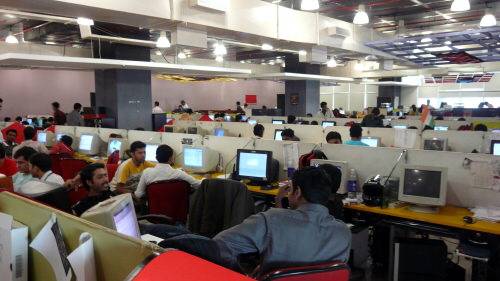
There has never been a better time to be an engineer, with companies feverishly competing to recruit the best and brightest. But while some engineers may be motivated to work for the highest bidder, most are driven by something more intangible, according to VisionMobile survey data: They want to change the world.
Each year LinkedIn measures the most in-demand Silicon Valley startups, a window into the employers that engineers think can do more than help them pay their mortgage. But does the expectation match up with reality? Glassdoor data may have the answer.
Who’s Hot With The Engineering Crowd?
How does LinkedIn measure the most in-demand startups? According to its blog, LinkedIn “compiled the list by analyzing millions of interactions between Bay Area startups with less than 500 employees and the more than 337,000 Bay Area software engineers and IT professionals on LinkedIn.” It’s not a perfect measure of the hottest startups to work for, but it’s certainly a helpful indicator.
In 2014, LinkedIn determined that the most in-demand startups for engineers are:
- Lytro (“The first high-end camera that lets you capture and harness the power of light field”)
- Theranos (“Working to shape the future of lab testing”)
- Fitbit (“Design products and experiences that fit seamlessly into your life so you can achieve your health and fitness goals, whatever they may be”)
- Coursera (“An education platform that partners with top universities and organizations worldwide, to offer courses online for anyone to take, for free”)
- Minted (“The world’s premier marketplace for independent design”)
- Wealthfront (“The world’s largest & fastest-growing automated investment service with over $1 billion in client assets”)
- Bromium (“Redefines endpoint security with a new approach focused on isolation rather than detection”)
- Twilio (“Lets you use standard web languages to build voice, VoIP and SMS applications via a web API”)
- Egnyte (“Provides Enterprise File Sharing built from the Cloud down”)
- Leap Motion (“Senses how you naturally move your hands and lets you use your computer in a whole new way.”)
Remembering Cloudera co-founder Jeff Hammerbacher’s lament that “The best minds of my generation are thinking about how to make people click ads,” it’s telling that these in-demand startups tend to be working on important problems, even if they’re not searching for the cure to cancer.
If LinkedIn’s past lists are any indication, the most in-demand startups tend to do well financially, too. Looking at 2013’s crop of the top-10 in-demand startups, six are now worth between $1 billion and $10 billion (Cloudera, Hortonworks, Dropbox, Jawbone, Nutanix and Pinterest), while three went public (Violin Memory, Nimble Storage and GoPro). The tenth? Big Switch Networks, which appears to be doing quite well even without either distinction.
And, After The Honeymoon
So that’s the promise of working for a hot startup. How does it match up with reality?
Just as I did for the top big data startups, it turns out that Glassdoor review data can reveal a lot about the realities of working at a hip company.
See also: What It’s Like Working At A Red-Hot Big Data Startup
Digging through Glassdoor data, it’s clear that…a job is a job. While engineers definitely remain enamored with the missions of their companies, the day-to-day grind of working with jerks or incompetent fools takes its toll on their happiness.
The good news, however, is that these in-demand startups mostly get things right. A rating of 4 or more on the Glassdoor scale suggests the company is an ideal employer. Half of these 10 companies meet that criteria.
That said, the ratings aren’t specific to engineering talent. Also, it’s hard to separate out exactly who is an engineer and who isn’t, as most reviewers prefer to remain anonymous. But with a little sleuthing here’s a reasonably accurate view of how engineers feel about these top-10 startups.
- Lytro (3.9 of 5)—Some technical staff praise the company because they get to “work on technology that will absolutely change the camera industry someday,” while others struggle with “middle management [that] is ineffective, or worse, jerks” and “micromanagement [that] is on the rise.”
- Theranos (4.1 of 5)—Most of the engineering employees sound like this reviewer, who says that “I have been a scientist for 20 years and never felt that my works actually matters until I started working here.” Others say that “co-workers are great, but here only because they need their job” and complain that “Often times you will work over 40 hours a week.” Imagine that.
- Fitbit (3.9 of 5)—Sixty-nine percent of employees would recommend Fitbit to a friend, with some lauding “how passionate everyone is” about the company’s mission. Others, however, say “management only cares about the engineers.” This isn’t a bad thing if you’re an engineer, of course, and the engineering reviews tend to be quite positive.
- Coursera (4.4 of 5)—A whopping 85% of Coursera employees want their friends to work with them, and it’s a bit of an engineering playground because of its “pretty unique Scala+Play stack, which is a pleasure to work on and [there are] plenty of interesting high growth projects in the pipeline.” While some loathe the dual-CEO structure, most seem pretty happy with the company and its future.
- Minted (3.2 of 5)—LinkedIn may rate Minted as hot, but its employees sure don’t. A mere 53% of employees would recommend it to a friend. Part of the problem may be that “Certain parts of the legacy codebase are brittle and need to be refactored” with the company disinclined to “paus[e] new feature work to reduce technical debt.” That, however, isn’t enough to explain the “insanely high turnover rate.”
- Wealthfront (4.5 of 5)—Only two reviews, so it’s hard to give the data much credence to the glowing reviews of the “amazing engineering culture” where “everyone is brilliant.” Still, those two people really seem to like it.
- Bromium (3.8 of 5)—Though 75% approve of the company, only 67% like the CEO. One product manager “feel[s] like I am in the process of birthing a new giant technology company,” yet also says “If you are at the stage in your life when you are prepared to work very hard and move up, this place may not be for you.” That sounds … promising?
- Twilio (4.2 of 5)—Some suggest that the “talent at every corner of this company is staggering,” while another engineer wonders why “A lot of focus is around what new features people are working on with very little thought around fixing existing infrastructure beyond the hyperbole people hear in group meetings.” Overall, engineering employees seem happy.
- Egnyte (3.6 of 5)—Only 76% of employees would recommend Egnyte to a friend. Some engineers suggest that Egnyte has a “strong mentor system in place to help new hires get up to speed,” but others bemoan a “[t]oxic culture that starts at the top and is pushed down.”
- Leap Motion (4.5 of 5)—Only two employees have bothered to write a review, but at least one of them has imbibed the Kool-Aid, gushing that “Everyone there is clearly passionate about the core mission,” concluding that “This is a rare opportunity to actually change the world.”
Most of these companies are not only hot with recruiters but also hot with employees, as the reviews show. But it still pays to do your homework before jumping into one of these startups, no matter how hot LinkedIn data suggests they are.
Lead photo by Cory Doctorow

















